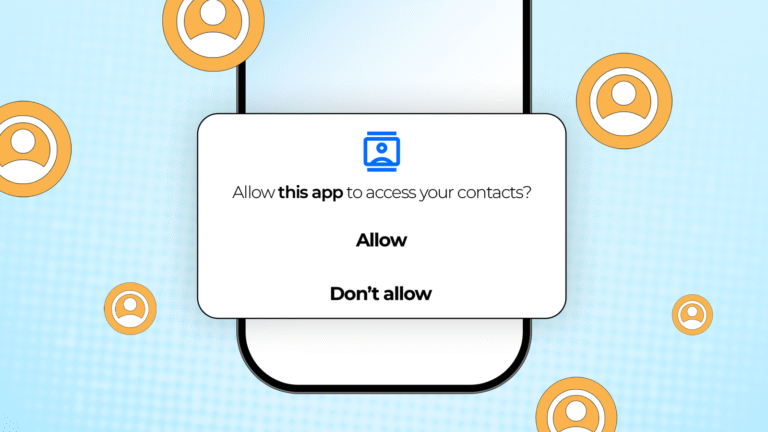
Protecting Your Personal Data: The Dangers of Allowing Apps to Access Your Contacts
Many popular apps, including social media and games, request access to your contacts, potentially putting your personal data and the data of those in your contact list at risk. This article explores the dangers of granting such permission and provides guidance on how to protect your privacy in the digital age.
The world of mobile apps is a vast and wondrous place, full of innovative tools and entertaining games. However, beneath the surface of this convenient and connected world lies a complex web of data collection and sharing. One of the most sensitive permissions that apps can request is access to your contacts. This permission, when granted, can allow apps to upload and share your entire address book, potentially leading to unwanted spam, scams, and even identity theft. In this article, we will delve into the reasons why apps request contact access, the risks associated with granting this permission, and what you can do to protect your personal data and the data of those in your contact list.
Why Do Apps Request Contact Access?
Apps request contact access for a variety of reasons, but often the stated reason is vague, such as “app functionality” or “improving user experience.” However, upon closer inspection, it becomes clear that many of these apps, including social media platforms like Pinterest, TikTok, Facebook, Instagram, Twitter, and LinkedIn, as well as browsers like Microsoft Edge and photo editors like PicsArt, are collecting contact data for analytics, advertising, and marketing purposes. Even games like Free Fire request access to your phonebook, despite having no apparent need for such data.
The Risks of Granting Contact Access
When you grant an app permission to access your contacts, you are essentially giving it the keys to your entire address book. This means that the app can see names, phone numbers, associated email addresses, and any other information you may have included when saving a contact. Once this data is uploaded to the app’s servers, it is no longer in your control. It can be copied, passed around, or stolen, potentially ending up in the hands of data brokers, telemarketers, or even scammers.
Some key highlights of the risks associated with granting contact access include:
* Allowing apps to upload and share your entire address book
* Exposing your contacts to potential spam, scams, and identity theft
* Enabling data brokers to trade, sell, and rent contact lists on the market
* Facilitating the creation of “ghost” profiles on people who have never signed up for a particular service
How Apps Use Contact Data
Apps use contact data in various ways, including:
* Contact-based suggestions: Apps will scan your contacts against their database of users to find people you might know.
* Analytics and advertising: Apps use contact data to build profiles on users and serve targeted ads.
* Marketing: Contact data is used to create targeted marketing campaigns.
Protecting Your Personal Data
To protect your personal data and the data of those in your contact list, it is essential to be cautious when granting apps permission to access your contacts. Here are some steps you can take:
* Only grant contact access to apps that absolutely need it, such as messaging apps like Telegram, Signal, or WhatsApp.
* Manually punch in phone numbers instead of granting contact access.
* Regularly review the permissions you have granted to apps and revoke any that are no longer necessary.
* Be aware of the potential risks associated with granting contact access and take steps to mitigate them.
Data Breaches and Cybersecurity Risks
Data breaches are a common occurrence, and even tech giants like Meta and Apple are not immune. When an app suffers a data breach, the contact data it has collected can be compromised, potentially leading to spam, scams, and identity theft. Furthermore, cybercriminals can use contact lists to create elaborate social engineering ploys, phishing scams, and other types of cyber attacks.
Your Name and Phone Number Are Likely in the Cloud
Even if you have never shared your personal data online, it is likely that your name and phone number are still in the cloud. This is because tech companies can build “ghost” profiles on people using contact lists uploaded to their platforms. For example, Meta likely has a shadow account with your name, generated based on contact lists uploaded to Facebook, even if you have never signed up for a Facebook account.
Conclusion
In conclusion, granting apps permission to access your contacts can have serious consequences for your personal data and the data of those in your contact list. By being cautious and only granting contact access to apps that absolutely need it, you can help protect your privacy and mitigate the risks associated with data collection and sharing.
Keywords: contact access, app permissions, data collection, data sharing, privacy, cybersecurity, social media, messaging apps, data breaches, identity theft, spam, scams, phishing, ghost profiles, shadow accounts.
Hashtags: #ContactAccess #AppPermissions #DataCollection #DataSharing #Privacy #Cybersecurity #SocialMedia #MessagingApps #DataBreaches #IdentityTheft #Spam #Scams #Phishing #GhostProfiles #ShadowAccounts
Source link